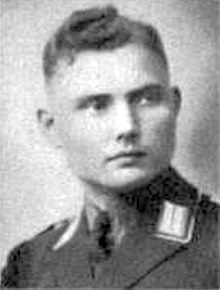Heinrich Siekmeier
Heinrich Siekmeier (born December 15, 1903 in Berenbusch , † December 25, 1984 in Obernkirchen ) was a German politician ( NSDAP ) and SS leader.
Live and act
After attending primary school , Siekmeier, the son of a railway conductor, worked from April 1918 to July 1921 as an apprentice and clerk at the Fürstlich-Schaumburg-Lippische Hofkammer in Bückeburg . From July 1921 to December 1926 he was a member of the Reichswehr . First he was at the III. Battalion of the 18th Infantry Regiment and then the headquarters of the 6th Division. He attended the army technical school. At the end of 1926 he was discharged from the reserve as chief rifleman .
On April 27, 1927, he joined the NSDAP (membership number 60 462). From December 1926 to April 15, 1927 he earned his living as an unskilled worker and employee, before he became managing director of the NSDAP publishing house “Der Nationalozialist” in Weimar from April 16, 1927 to August 1933. From July 1927 to the end of 1933 he was also the manager of the Thuringia district. From 1934 to 1936 he acted as Gau organization and Gaupersonalamtsleiter and deputy Gauleiter . Siekmeier had been a member of the SS since July 5, 1936 , in which he achieved the rank of brigade leader.
In addition, Siekmeier held offices as councilor of the city of Weimar and as regional group leader of the Federation of German East . From March 29, 1936 until the end of the Nazi regime in the spring of 1945, he was also a member of the National Socialist Reichstag for constituency 12 (Thuringia) . From April 20, 1938 to April 12, 1945 he held the title of "Council of State" of the Thuringian state government.
The US Army arrested him on June 5, 1945 and interned him in Ludwigsburg . In March 1947 he managed to escape to Switzerland, where he was arrested. On May 22, 1948, he was classified as the main culprit and sentenced to five years in a labor camp, taking into account internment, as well as the complete collection of assets by the Ludwigsburg-Hohenasperg camp judgment chamber . In mid-December 1948 Siekmeier was released from custody following a pardon from the Württemberg-Baden Prime Minister. He moved to Petzen and from 1950 lived in Wülpke near Porta Westfalica . From 1951 he worked there as a district inspector for an insurance company.
Fonts
- with Richard Kolb : Radio and film in the service of national culture , Düsseldorf: Floeder, 1933.
- Primer on the Versailles Peace Dictate, Velhagen & Klasing: Bielefeld / Leipzig 1933, edition for schools for the deaf and mute, edited. v. Georg Thiel 1934.
literature
- Joachim Lilla , Martin Döring, Andreas Schulz: extras in uniform. The members of the Reichstag 1933–1945. A biographical manual. Including the ethnic and National Socialist members of the Reichstag from May 1924. Droste, Düsseldorf 2004, ISBN 3-7700-5254-4 , pp. 618–619.
- Erich Stockhorst : 5000 people. Who was what in the 3rd Reich . 2nd Edition. Arndt, Kiel 2000, ISBN 3-88741-116-1 .
Web links
- Heinrich Siekmeier in the database of members of the Reichstag
Individual evidence
- ↑ a b Bernhard Post, Volker Wahl (Ed.): Thuringia Handbook. Territory, constitution, parliament, government and administration in Thuringia 1920 to 1995 (= publications from Thuringian state archives; 1). Weimar 1999, ISBN 3-7400-0962-4 , p. 630.
| personal data | |
|---|---|
| SURNAME | Siekmeier, Heinrich |
| BRIEF DESCRIPTION | German politician (NSDAP), MdR and SS leader |
| DATE OF BIRTH | December 15, 1903 |
| PLACE OF BIRTH | Berenbusch |
| DATE OF DEATH | December 25, 1984 |
| Place of death | Obernkirchen |
